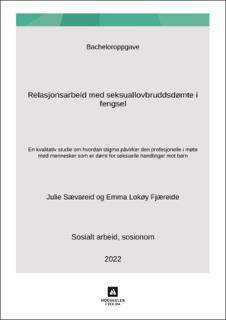Relasjonsarbeid med seksuallovbruddsdømte i fengsel. En kvalitativ studie om hvordan stigma påvirker den profesjonelle i møte med mennesker som er dømt for seksuelle handlinger mot barn
Bachelor thesis
Permanent lenke
https://hdl.handle.net/11250/3007533Utgivelsesdato
2022Metadata
Vis full innførselSamlinger
Sammendrag
Mennesker som begår seksuelle handlinger mot barn er et reelt samfunnsproblem i Norge. Seksuallovbruddsdømte er innsatte det er knyttet sterke stigmatiserende holdninger til, noe som kan medføre brutte relasjoner og isolasjon. Selv om mange tar avstand fra de domfelte, er det ikke alle som verken vil eller kan gjøre det. Sosialarbeidere er profesjonsutøvere som står i relasjon til marginaliserte og stigmatiserte grupper. Med verdier som blant annet likeverd, ikke-diskriminering og respekt i bunn, skal alle brukere og innsatte få rettferdig behandling i møte med hjelpeapparatet. Likevel viser forskning at det finnes stigmatiserende holdninger i hjelpeapparatet, og at dette kan påvirke rehabiliteringsforløpet til seksuallovbruddsdømte i fengsel. For å unngå forskjellsbehandling i hjelpeapparatet er det aktuelt å rette fokus mot stigmaproblematikk, samt få mer nasjonal forskning knyttet til dette. Studiens overordnede perspektiv er teori knyttet til stigma og relasjonsarbeid i, gjennom og med relasjon. Oppgaven ønsket å finne svar på hvordan sosialarbeidere opplever relasjonsarbeid med mennesker som er dømt for seksuelle handlinger mot barn. Studien er en beskrivende kvalitativ intervjustudie, hvor dybdeintervju ble benyttet for å få innblikk i informantenes erfaringer og refleksjoner. Data ble innhentet fra fengsler lokalisert i ulike regioner i Norge, med utelukkende mannlige innsatte. Funnene viser til at informantene omtaler seksuallovbruddsdømte på en stigmatiserende måte. Samtlige informanter opplever usikkerhet knyttet til samhandling med seksuallovbruddsdømte og deres private nettverk. Noe som påvirker endringsarbeidet med innsatte. Studien konkluderer med at sosialarbeiderne opplevde relasjonsarbeid med seksuallovbruddsdømte som krevende og derfor etablerte en profesjonell distanse. Noe som på den ene siden medførte at sosialarbeiderne håndterte å stå i relasjonen, men som på den andre siden påvirket endringsarbeid i løpet av soningsoppholdet. Abstract
Persons committing sexual abuse towards children is a real problem in the Norwegian society. Convicted sex offenders are associated with heavy stigmatized attitudes. A sentence that can lead to broken relations and isolation. Although most people distance themselves from the convicted abusers, not everybody can or will distance themselves. Social workers are exercising a profession which entails that they have to stand in relation to marginalized and stigmatized groups. With basic values like equality, non-discrimination and respect, all service users should be met with fair and just treatment by the professionals. Still, research finds that stigmatizing attitude is present within the field of social work, and that the presence of such attitude affects the path of rehabilitation for convicted sex offenders in prison. To avoid deviating treatment of convicted sex offenders in the social services it is important to direct focus towards the prevailing stigmatizing issue, in order to have more research on this area at a national level. The main perspective of this study is theory related to stigma and relational work in, through and with the relation. The study has set a goal to find answers as to how social workers experience relational work with persons convicted for sexual misconduct towards children. The study has been conducted as a descriptive, qualitative interview study where in-dept interviews were used as a method to get insight into the experiences and reflections of informants in their work with convicted sex offenders. Data was gathered from prisons localized in different regions in Norway. The findings show that the informants refer to the convicted sex offenders in a stigmatizing way. All of the informants experience uncertainty related to interaction with the convicted sex offenders and their private network, this uncertainty in turn affect the behavioral change work with the inmates. The study concludes that social workers find relational work with sexual crime convicted to be demanding and in doing so the social workers establish a professional distance towards the inmates. On one hand it has the effect that the social workers are able to uphold their work in the relation, on the other hand this distancing also affect the change work going taking place during the prison term of the convicted persons.
